
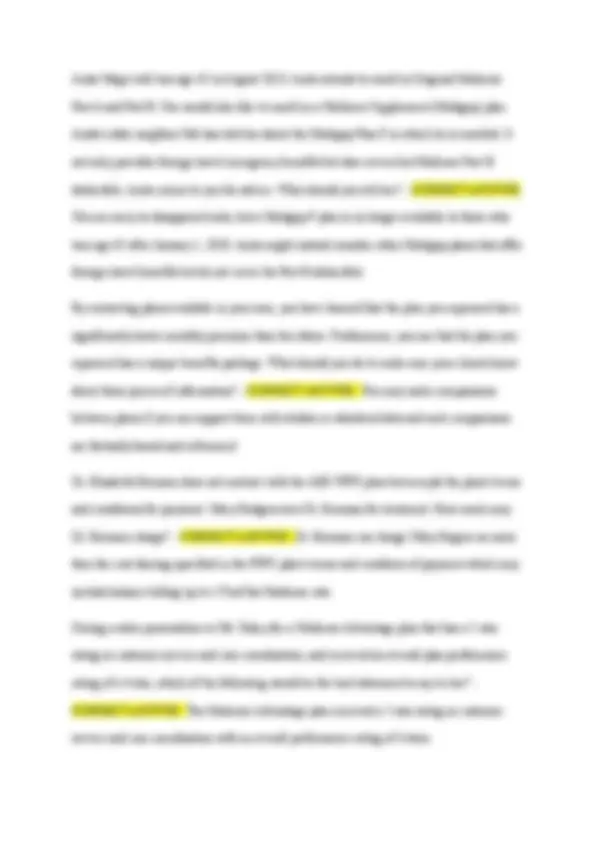
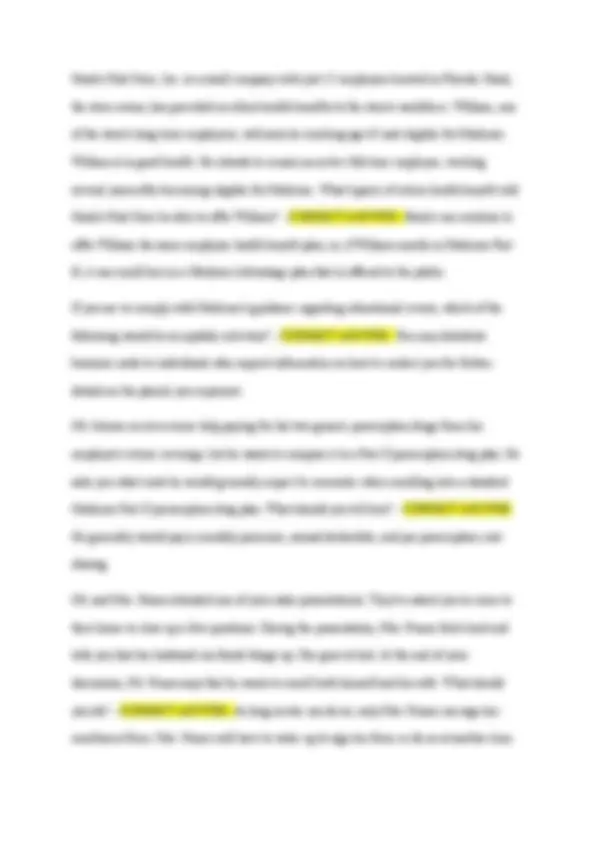

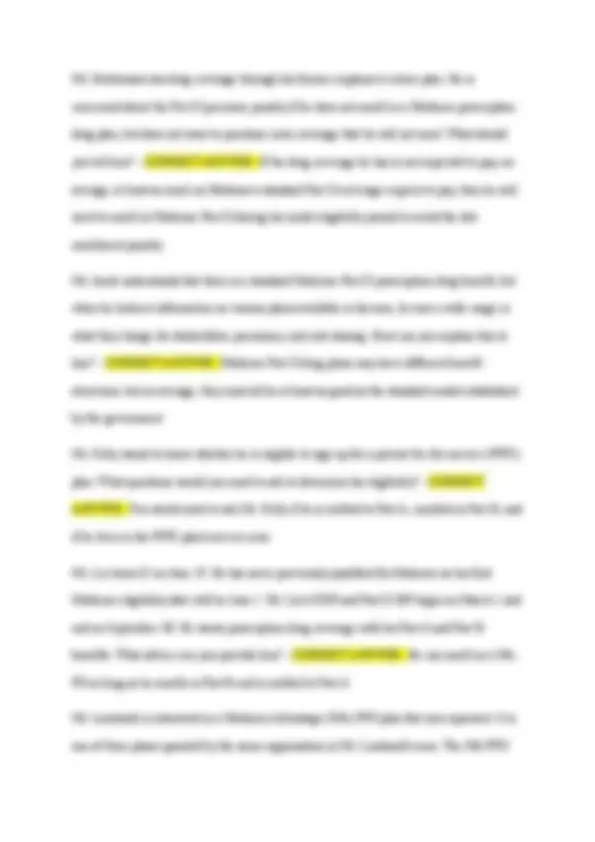

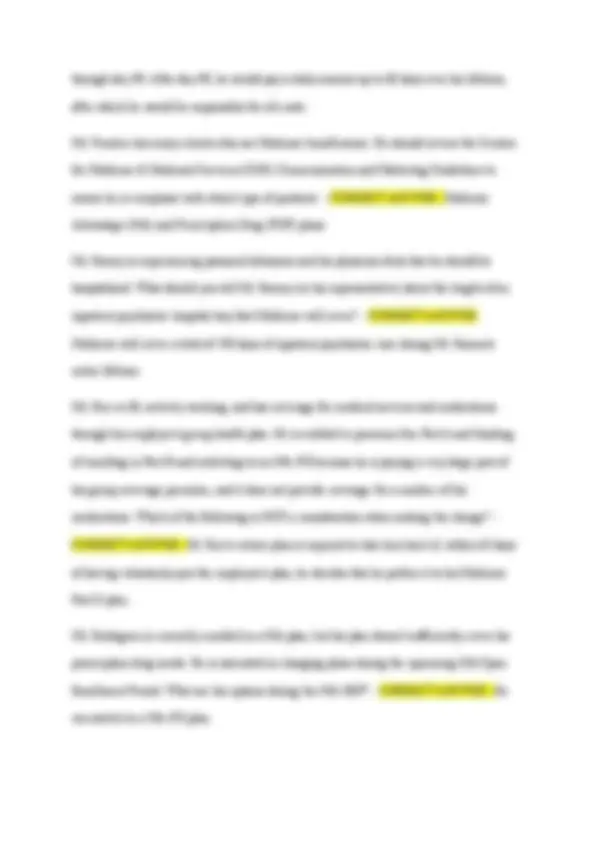


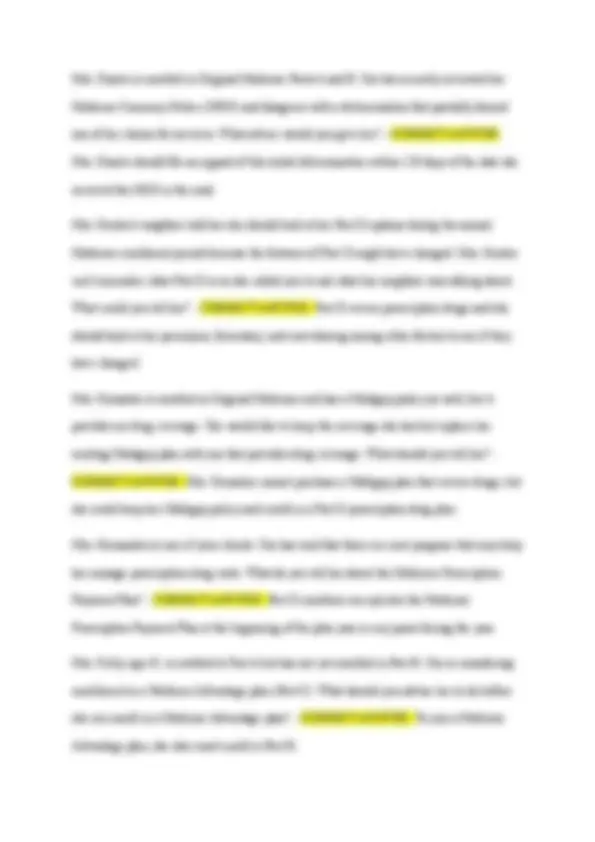
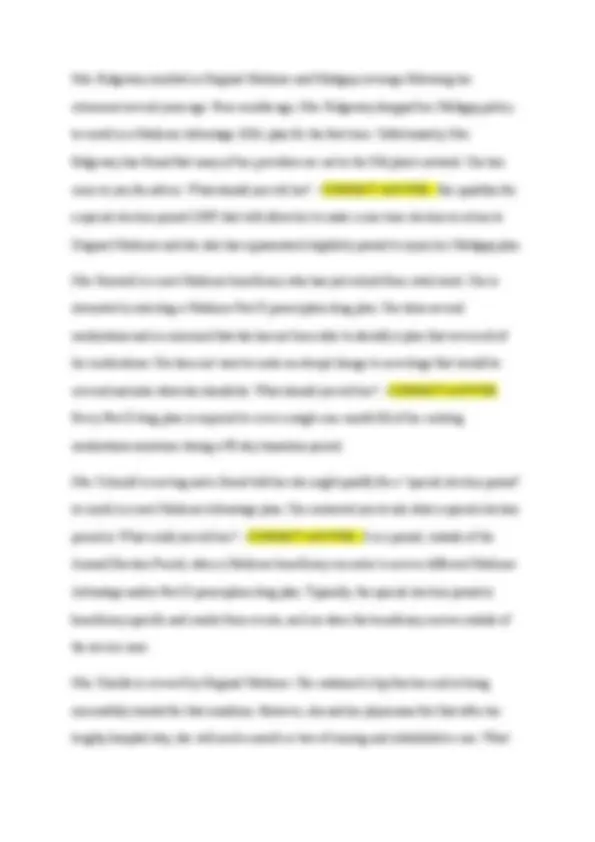
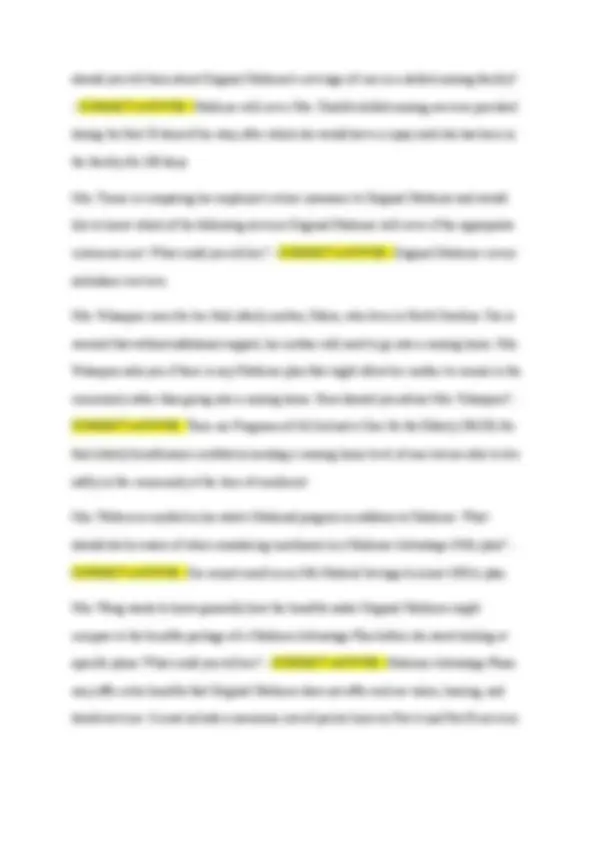
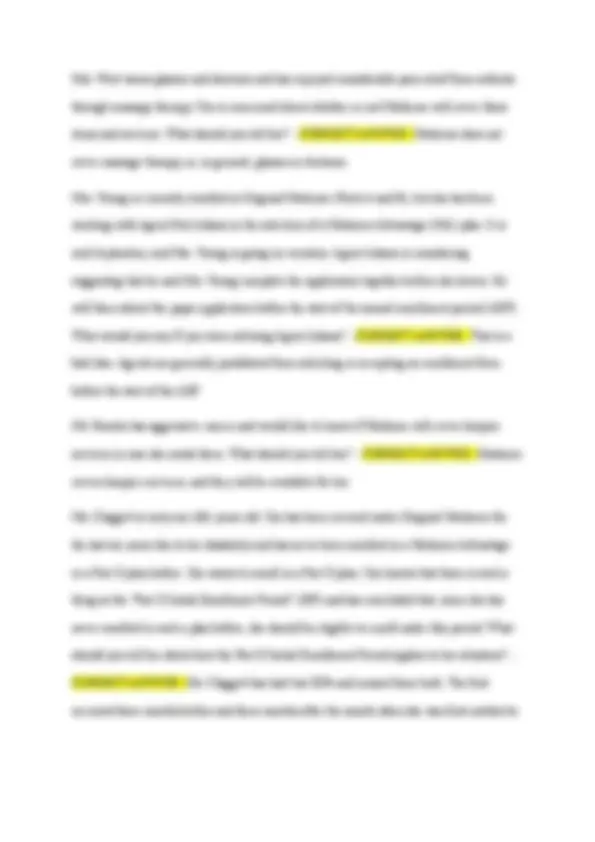





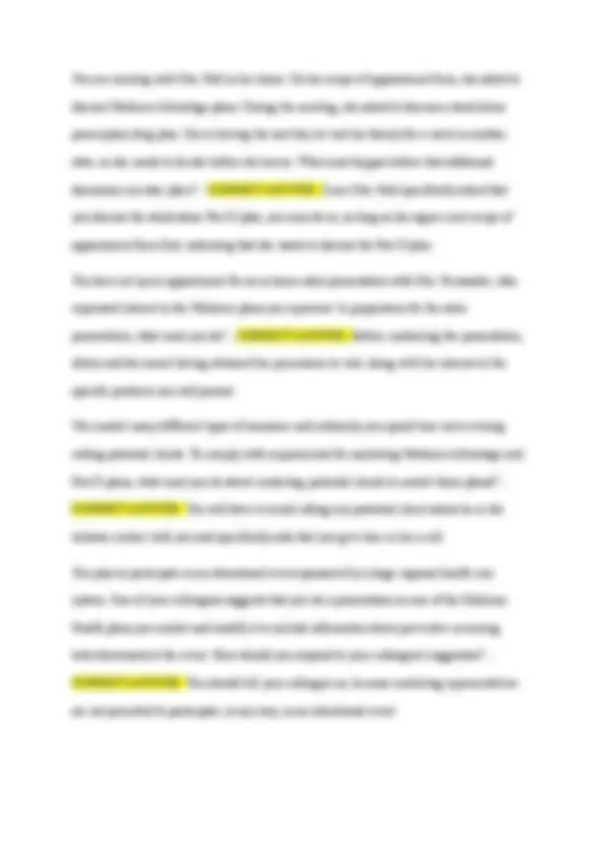



Study with the several resources on Docsity

Earn points by helping other students or get them with a premium plan


Prepare for your exams
Study with the several resources on Docsity

Earn points to download
Earn points by helping other students or get them with a premium plan
Community
Ask the community for help and clear up your study doubts
Discover the best universities in your country according to Docsity users
Free resources
Download our free guides on studying techniques, anxiety management strategies, and thesis advice from Docsity tutors
2025 AHIP Final Exam Questions and Verified Answers
Typology: Exams
1 / 27

This page cannot be seen from the preview
Don't miss anything!




















A Medicare beneficiary has walked into your office and requested that you sit down with her and discuss her options under the Medicare Advantage program. Before engaging in such a discussion, what should you do? - CORRECT ANSWER You must have her sign a scope of appointment form, indicating which products she wishes to discuss. You may then proceed with the discussion. Agent Harriet Walker has recently begun marketing Medicare Advantage and related products aimed at meeting the needs of senior citizens. Client Mildred Jones has expressed interest in a Medicare Advantage plan. It is now the beginning of September. If you were in Agent Walker's position, what would you do? - CORRECT ANSWER Inquire whether the client qualifies for a special enrollment period, and if not, solicit an enrollment application once the annual open enrollment election period begins on October 15th. Agent Jennings makes a presentation on Medicare advertised as an educational event. Agent Jennings distributes materials that are solely educational. However, she gives a brief presentation that mentions plan-specific premiums. Is this a prohibited activity at an event that has been advertised as educational? - CORRECT ANSWER Yes. When an event has been advertised as "educational," discussing plan-specific premiums is impermissible. Alice is enrolled in a MA-PD plan. She makes a permanent move across the country and wonders what her options are for continuing MA-PD coverage. What would you say to her in regard to a special enrollment period (SEP)? - CORRECT ANSWER She is likely to qualify for a SEP. She can choose an effective date of up to three months after the month in which the enrollment form is received by the new plan, but the effective date may not be earlier than the date of her permanent move.
Hank's Fish Store, Inc. is a small company with just 15 employees located in Florida. Hank, the store owner, has provided excellent health benefits to the store's workforce. William, one of the store's long-time employees, will soon be reaching age 65 and eligible for Medicare. William is in good health. He intends to remain an active full-time employee, working several years after becoming eligible for Medicare. What type(s) of retiree health benefit will Hank's Fish Store be able to offer William? - CORRECT ANSWER Hank's can continue to offer William the same employee health benefit plan, or, if William enrolls in Medicare Part B, it can enroll him in a Medicare Advantage plan that is offered to the public. If you are to comply with Medicare's guidance regarding educational events, which of the following would be acceptable activities? - CORRECT ANSWER You may distribute business cards to individuals who request information on how to contact you for further details on the plan(s) you represent. Mr. Alonso receives some help paying for his two generic prescription drugs from his employer's retiree coverage, but he wants to compare it to a Part D prescription drug plan. He asks you what costs he would generally expect to encounter when enrolling into a standard Medicare Part D prescription drug plan. What should you tell him? - CORRECT ANSWER He generally would pay a monthly premium, annual deductible, and per-prescription cost- sharing. Mr. and Mrs. Nunez attended one of your sales presentations. They've asked you to come to their home to clear up a few questions. During the presentation, Mrs. Nunez feels tired and tells you that her husband can finish things up. She goes to bed. At the end of your discussion, Mr. Nunez says that he wants to enroll both himself and his wife. What should you do? - CORRECT ANSWER As long as she can do so, only Mrs. Nunez can sign her enrollment form. Mrs. Nunez will have to wake up to sign her form or do so at another time.
Mr. and Mrs. Vaughn both take a specialized multivitamin prescription each day. Mr. Vaughn takes a prescription to help to regrow his hair. They are anxious to have their Medicare prescription drug plan cover these drug needs. What should you tell them? - CORRECT ANSWER Medicare prescription drug plans are not permitted to cover the prescription medications the Vaughns are interested in under Part D coverage, however, plans may cover them as supplemental benefits and the Vaughns could look into that possibility. Mr. Anderson is a very organized individual and has filled out and brought to you an enrollment form on October 10 for a new plan available on January 1 next year. He is currently enrolled in Original Medicare. What should you do? - CORRECT ANSWER Tell Mr. Anderson that you cannot accept any enrollment forms until the annual election period begins. Mr. Barker enjoys a comfortable retirement income. He recently had surgery and expected that he would have certain services and items covered by the plan with minimal out-of-pocket costs because his MA-PD coverage has been very good. However, when he received the bill, he was surprised to see large charges in excess of his maximum out-of-pocket limit that included some services and items he thought would be fully covered. He called you to ask what he could do? What could you tell him? - CORRECT ANSWER You can offer to review the plans appeal process to help him ask the plan to review the coverage decision. Mr. Bickford did not quite qualify for the extra help low-income subsidy under the Medicare Part D Prescription Drug program and he is wondering if there is any other option he has for obtaining help with his considerable drug costs. What should you tell him? - CORRECT ANSWER He could check with the manufacturers of his medications to see if they offer an assistance program to help people with limited means to obtain the medications they need.
at any time however coverage usually begins on the fourth month after dialysis treatments start. Mr. Diaz continued working with his company and was insured under his employer's group plan until he reached age 68. He has heard that there is a premium penalty for those who did not sign up for Part B when first eligible and wants to know how much he will have to pay. What should you tell him? - CORRECT ANSWER Mr. Diaz will not pay any penalty because he had continuous coverage under his employer's plan. Mr. Ford enrolled in an MA-only plan in mid-November during the Annual Election Period (AEP). On December 1, he calls you up and says that he has changed his mind and would like to enroll in a MA-PD plan. What enrollment rules would apply in this case? - CORRECT ANSWER He can make as many enrollment changes as he likes during the Annual Election Period and the last choice made before the end of the period will be the effective one as of January 1. Mr. Garcia was told he qualifies for a special election period (SEP), but he lost the paper that explains what he could do during the SEP. What can you tell him? - CORRECT ANSWER If the SEP is for MA coverage, he will generally have one opportunity to change his MA coverage. Mr. Hildalgo complains to you that because he takes multiple expensive drugs, he has trouble paying his cost sharing for his prescription drugs, particularly at the beginning of the year during the deductible phase. He is happy with his plan and does not want to change. However, he said he had heard about a new program called the Medicare Prescription Payment Plan and asked whether it might help. What do you tell him? - CORRECT ANSWER The Medicare Prescription Payment Plan helps spread out beneficiary cost- sharing payments but does not decrease the total amount owed.
Mr. Hutchinson has drug coverage through his former employer's retiree plan. He is concerned about the Part D premium penalty if he does not enroll in a Medicare prescription drug plan, but does not want to purchase extra coverage that he will not need. What should you tell him? - CORRECT ANSWER If the drug coverage he has is not expected to pay, on average, at least as much as Medicare's standard Part D coverage expects to pay, then he will need to enroll in Medicare Part D during his initial eligibility period to avoid the late enrollment penalty. Mr. Jacob understands that there is a standard Medicare Part D prescription drug benefit, but when he looks at information on various plans available in his area, he sees a wide range in what they charge for deductibles, premiums, and cost sharing. How can you explain this to him? - CORRECT ANSWER Medicare Part D drug plans may have different benefit structures, but on average, they must all be at least as good as the standard model established by the government. Mr. Kelly wants to know whether he is eligible to sign up for a private fee-for-service (PFFS) plan. What questions would you need to ask to determine his eligibility? - CORRECT ANSWER You would need to ask Mr. Kelly if he is entitled to Part A, enrolled in Part B, and if he lives in the PFFS plan's service area. Mr. Liu turns 65 on June 19. He has never previously qualified for Medicare so his first Medicare eligibility date will be June 1. Mr. Liu's ICEP and Part D IEP begin on March 1 and end on September 30. He wants prescription drug coverage with his Part A and Part B benefits. What advice can you provide him? - CORRECT ANSWER He can enroll in a MA- PD as long as he enrolls in Part B and is entitled to Part A. Mr. Lombardi is interested in a Medicare Advantage (MA) PPO plan that you represent. It is one of three plans operated by the same organization in Mr. Lombardi's area. The MA PPO
through day 90. After day 90, he would pay a daily amount up to 60 days over his lifetime, after which he would be responsible for all costs. Mr. Prentice has many clients who are Medicare beneficiaries. He should review the Centers for Medicare & Medicaid Services (CMS) Communication and Marketing Guidelines to ensure he is compliant with which type of products. - CORRECT ANSWER Medicare Advantage (MA) and Prescription Drug (PDP) plans. Mr. Rainey is experiencing paranoid delusions and his physician feels that he should be hospitalized. What should you tell Mr. Rainey (or his representative) about the length of an inpatient psychiatric hospital stay that Medicare will cover? - CORRECT ANSWER Medicare will cover a total of 190 days of inpatient psychiatric care during Mr. Rainey's entire lifetime. Mr. Rice is 68, actively working, and has coverage for medical services and medications through his employer's group health plan. He is entitled to premium free Part A and thinking of enrolling in Part B and switching to an MA-PD because he is paying a very large part of his group coverage premium, and it does not provide coverage for a number of his medications. Which of the following is NOT a consideration when making the change? - CORRECT ANSWER Mr. Rice's retiree plan is required to take him back if, within 63 days of having voluntarily quit the employer's plan, he decides that he prefers it to his Medicare Part D plan. Mr. Rodriguez is currently enrolled in a MA plan, but his plan doesn't sufficiently cover his prescription drug needs. He is interested in changing plans during the upcoming MA Open Enrollment Period. What are his options during the MA OEP? - CORRECT ANSWER He can switch to a MA-PD plan.
Mr. Romero is 64, retiring soon, and considering enrollment in his employer-sponsored retiree group health plan that includes drug coverage with nominal copays. He heard about a neighbor's MA-PD plan that you represent and because he takes numerous prescription drugs, he is considering signing up for it. What should you tell him? - CORRECT ANSWER He should compare the benefits in his employer-sponsored retiree group health plan with the benefits in his neighbor's MA-PD plan to determine which one will provide sufficient coverage for his prescription needs. Mr. Sanchez has just turned 65 and is entitled to Part A but has not enrolled in Part B because he has coverage through an employer plan. If he wants to enroll in a Medicare Advantage plan, what will he have to do? - CORRECT ANSWER He will have to enroll in Part B. Mr. Shapiro gets by on a very small amount of fixed income. He has heard there may be extra help paying for Part D prescription drugs for Medicare beneficiaries with limited income. He wants to know whether he might qualify. What should you tell him? - CORRECT ANSWER The extra help is available to beneficiaries whose income and assets do not exceed annual limits specified by the government. Mr. Singh would like drug coverage but does not want to be enrolled in a Medicare Advantage plan. What should you tell him? - CORRECT ANSWER Mr. Singh can enroll in a stand-alone prescription drug plan and continue to be covered for Part A and Part B services through Original Fee-for-Service Medicare. Mr. Torres has a small savings account. He would like to pay for his monthly Part D premiums with an automatic monthly withdrawal from his savings account until it is exhausted, and then have his premiums withheld from his Social Security check. What should you tell him? - CORRECT ANSWER In general, he must select a single Part D premium payment mechanism that will be used throughout the year.
provided to Medicare beneficiaries? - CORRECT ANSWER Beneficiaries under Original Medicare have no cost-sharing for most preventive services. Mr. Yoo's employer has recently dropped comprehensive creditable prescription drug coverage that was offered to company retirees. The company told Mr. Yoo that, because he was affected by this change, he would qualify for a special election period. Mr. Yoo contacted you to find out more about what this means. What can you tell him? - CORRECT ANSWER It means that he qualifies for a one-time opportunity to enroll in an MA-PD or Part D prescription drug plan. Mr. Zachow has a condition for which three drugs are available. He has tried two but had an allergic reaction to them. Only the third drug works for him and it is not on his Part D plan's formulary. What could you tell him to do? - CORRECT ANSWER Mr. Zachow has a right to request a formulary exception to obtain coverage for his Part D drug. He or his physician could obtain the standardized request form on the plan's website, fill it out, and submit it to his plan. Mrs. Albertson has been enrolled in a Medicare Part D plan for several years. She takes several brand name drugs and is interested in learning about the Medicare Prescription Payment Plan. What should you tell her? - CORRECT ANSWER Enrollees can opt out of the program at any time. However, they will continue to be billed for any cost-sharing amounts still owed. Mrs. Allen has a rare condition for which two different brand name drugs are the only available treatment. She is concerned that since no generic prescription drug is available and these drugs are very high cost, she will not be able to find a Medicare Part D prescription drug plan that covers either one of them. What should you tell her? - CORRECT ANSWER Medicare prescription drug plans are required to cover drugs in each therapeutic category.
She should be able to enroll in a Medicare prescription drug plan that covers the medications she needs. Mrs. Burton is a retiree with substantial income. She is enrolled in an MA-PD plan and was disappointed with the service she received from her primary care physician because she was told she would have to wait five weeks to get an appointment when she was feeling ill. She called you to ask what she could do so she would not have to put up with such poor access to care. What could you tell her? - CORRECT ANSWER She could file a grievance with her plan to complain about the lack of timeliness in getting an appointment. Mrs. Chen will be 65 soon, has been a citizen for twelve years, has been employed full time, and paid taxes during that entire period. She is concerned that she will not qualify for coverage under part A because she was not born in the United States. What should you tell her? - CORRECT ANSWER Most individuals who are citizens and age 65 or over are covered under Part A by virtue of having paid Medicare taxes while working, though some may be covered as a result of paying monthly premiums. Mrs. Chi is age 75 and enjoys a comfortable but not extremely high-income level. She wishes to enroll in a MA MSA plan that she heard about from her neighbor. She also wants to have prescription drug coverage since her doctor recently prescribed several expensive medications. Currently, she is enrolled in Original Medicare and a standalone Part D plan. How would you advise Mrs. Chi? - CORRECT ANSWER Mrs. Chi may enroll in a MA MSA plan and remain in her current standalone Part D prescription drug plan. Mrs. Chou likes a Private Fee-for-Service (PFFS) plan available in her area that does not include drug coverage. She wants to enroll in the plan and enroll in a stand-alone prescription drug plan. What should you tell her? - CORRECT ANSWER She could enroll in a PFFS plan and a stand-alone Medicare prescription drug plan.
Mrs. Kendrick is in good health, has worked for many years, and is six months away from turning 65. She wants to know what she will have to do to enroll in a Medicare Advantage (MA) plan as soon as possible. What could you tell her? - CORRECT ANSWER She may enroll in an MA plan beginning three months immediately before her first entitlement to both Medicare Part A and Part B. Mrs. Lopez is enrolled in a cost plan for her Medicare benefits. She has recently lost creditable coverage previously available through her husband's employer. She is interested in enrolling in a Medicare Part D prescription drug plan (PDP). What should you tell her? - CORRECT ANSWER If a Part D benefit is offered through her plan she may choose to enroll in that plan or a standalone PDP. Mrs. Lyons is in good health, uses a single prescription, and lives independently in her own home. She is attracted by the idea of maintaining control over a Medical Savings Account (MSA) but is not sure if the plan associated with the account will fit her needs. What specific piece of information about a Medicare MSA plan would it be important for her to know, prior to enrolling in such a plan? - CORRECT ANSWER All MSAs cover Part A and Part B benefits, but not Part D prescription drug benefits, which could be obtained by also enrolling in a separate prescription drug plan. Mrs. Mulcahy, age 65, is concerned that she may not qualify for enrollment in a Medicare prescription drug plan because, although she is entitled to Part A, she is not enrolled under Medicare Part B. What should you tell her? - CORRECT ANSWER An individual who is entitled to Part A or enrolled under Part B is eligible to enroll in a Medicare prescription drug plan. As long as Mrs. Mulcahy is entitled to Part A, she does not need to enroll under Part B before enrolling in a prescription drug plan.
Mrs. Park is an elderly retiree. Mrs. Park has a low fixed income. What could you tell Mrs. Park that might be of assistance? - CORRECT ANSWER She should contact her state Medicaid agency to see if she qualifies for one of several programs that can help with Medicare costs for which she is responsible. Mrs. Paterson is concerned about the deductibles and co-payments associated with Original Medicare. What can you tell her about Medigap as an option to address this concern? - CORRECT ANSWER Medigap plans do not cover Original Medicare benefits, but they coordinate with Original Medicare coverage. Mrs. Pierce would like to enroll in a Medicare Cost plan that offers Part D prescription drug coverage. She comes to you for advice about when she can enroll in a plan you have previously discussed. What should you tell her? - CORRECT ANSWER Enrollment in Cost plans offering Part D coverage is available only during enrollment periods under the Part D program, and Cost plans must accept enrollments during these periods. Mrs. Quinn recently turned 66 and decided after many years of work to retire and begin receiving Social Security benefits. Shortly thereafter Mrs. Quinn received a letter informing her that she had been automatically enrolled in Medicare Part B. She wants to understand what this means. What should you tell Mrs. Quinn? - CORRECT ANSWER Part B primarily covers physician services. She will be paying a monthly premium and, except for many preventive and screening tests, generally will have 20% co-payments for these services, in addition to an annual deductible. Mrs. Radford asks whether there are any special eligibility requirements for Medicare Advantage. What should you tell her? - CORRECT ANSWER Mrs. Radford must be entitled to Part A and enrolled in Part B to enroll in Medicare Advantage.
should you tell them about Original Medicare's coverage of care in a skilled nursing facility?
Mrs. West wears glasses and dentures and has enjoyed considerable pain relief from arthritis through massage therapy. She is concerned about whether or not Medicare will cover these items and services. What should you tell her? - CORRECT ANSWER Medicare does not cover massage therapy, or, in general, glasses or dentures. Mrs. Young is currently enrolled in Original Medicare (Parts A and B), but she has been working with Agent Neil Adams in the selection of a Medicare Advantage (MA) plan. It is mid-September, and Mrs. Young is going on vacation. Agent Adams is considering suggesting that he and Mrs. Young complete the application together before she leaves. He will then submit the paper application before the start of the annual enrollment period (AEP). What would you say If you were advising Agent Adams? - CORRECT ANSWER This is a bad idea. Agents are generally prohibited from soliciting or accepting an enrollment form before the start of the AEP. Ms. Brooks has aggressive cancer and would like to know if Medicare will cover hospice services in case she needs them. What should you tell her? - CORRECT ANSWER Medicare covers hospice services, and they will be available for her. Ms. Claggett is sixty-six (66) years old. She has been covered under Original Medicare for the last six years due to her disability and has never been enrolled in a Medicare Advantage or a Part D plan before. She wants to enroll in a Part D plan. She knows that there is such a thing as the "Part D Initial Enrollment Period" (IEP) and has concluded that, since she has never enrolled in such a plan before, she should be eligible to enroll under this period. What should you tell her about how the Part D Initial Enrollment Period applies to her situation? - CORRECT ANSWER Ms. Claggett has had two IEPs and missed them both. The first occurred three months before and three months after the month when she was first entitled to